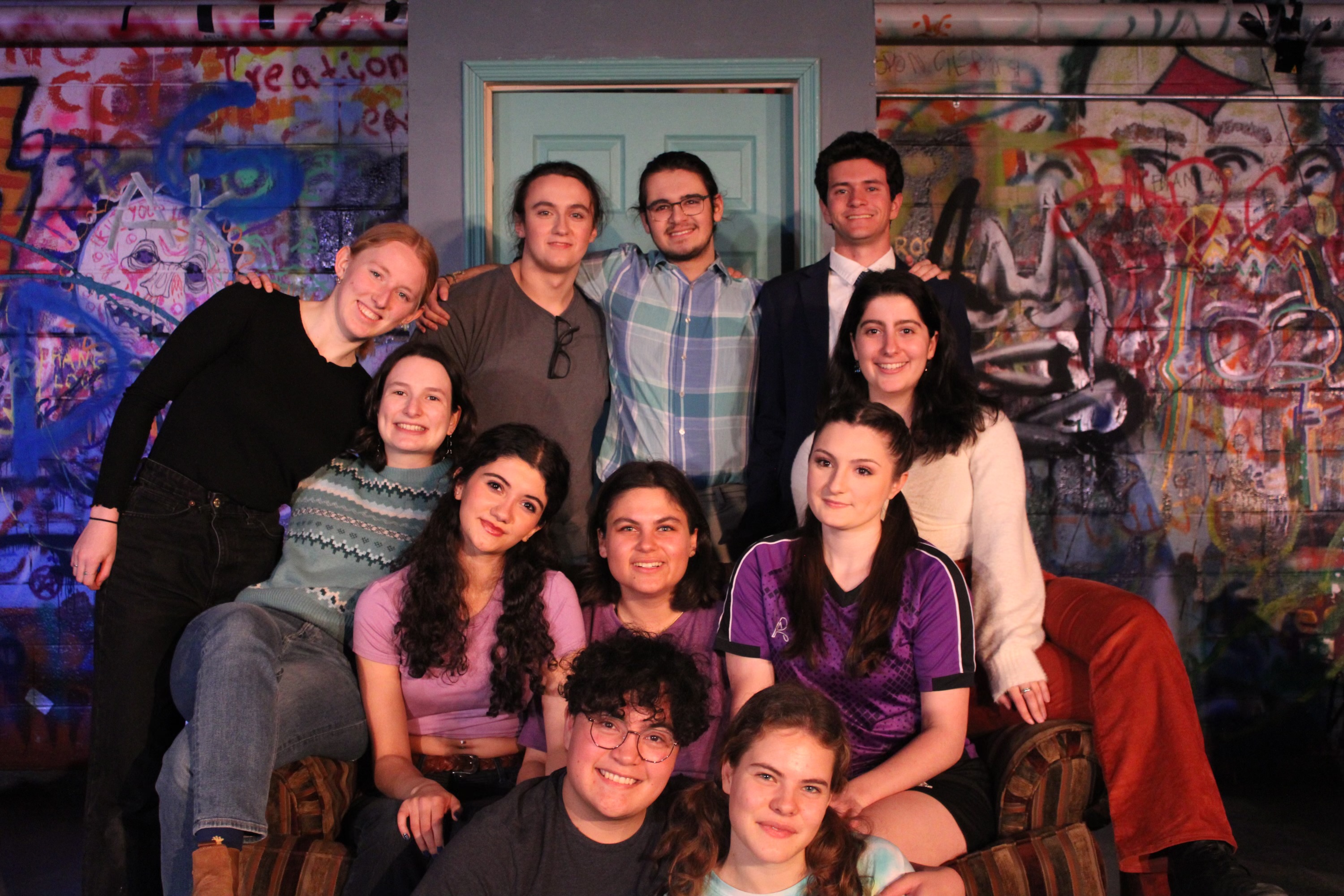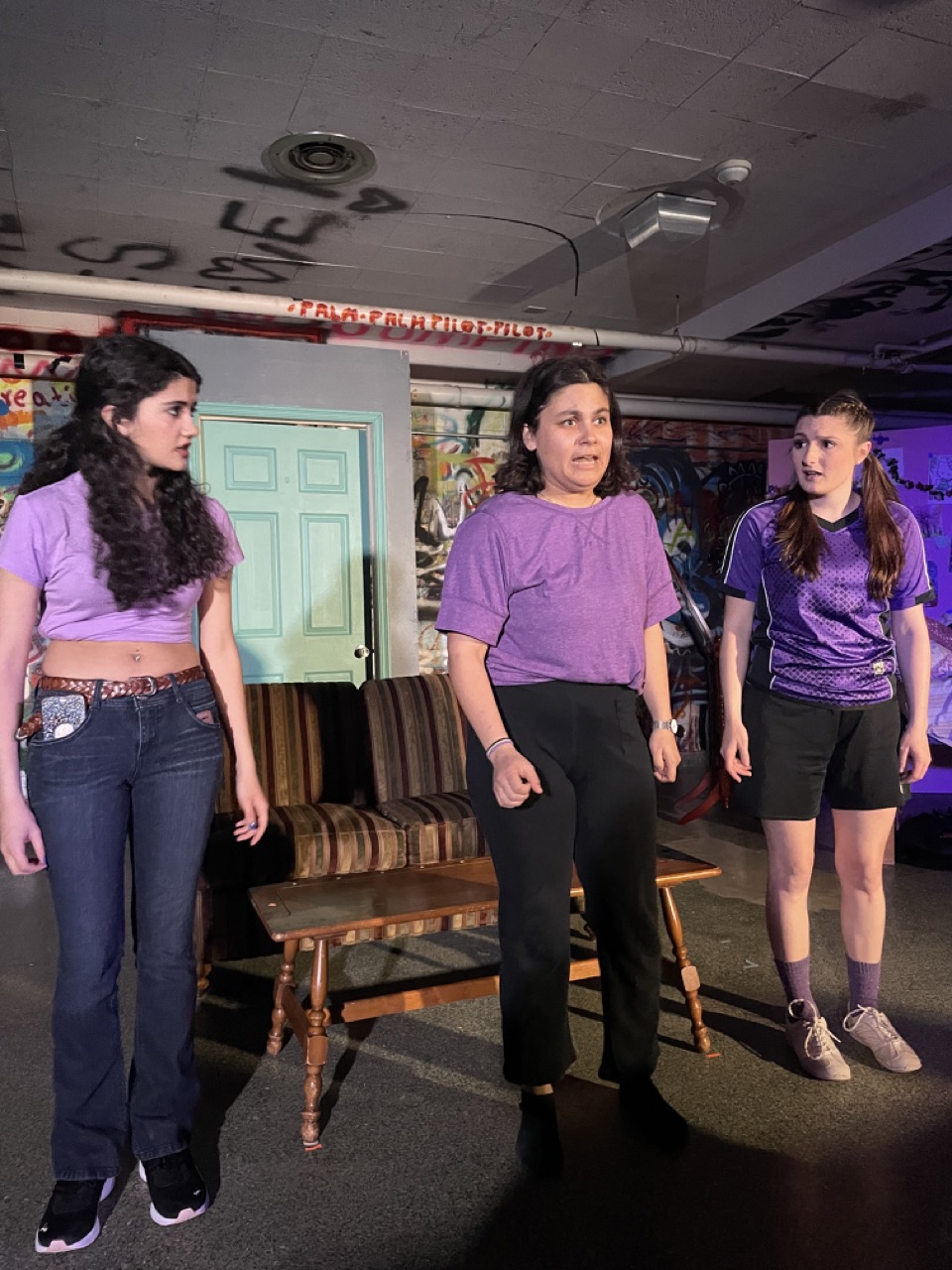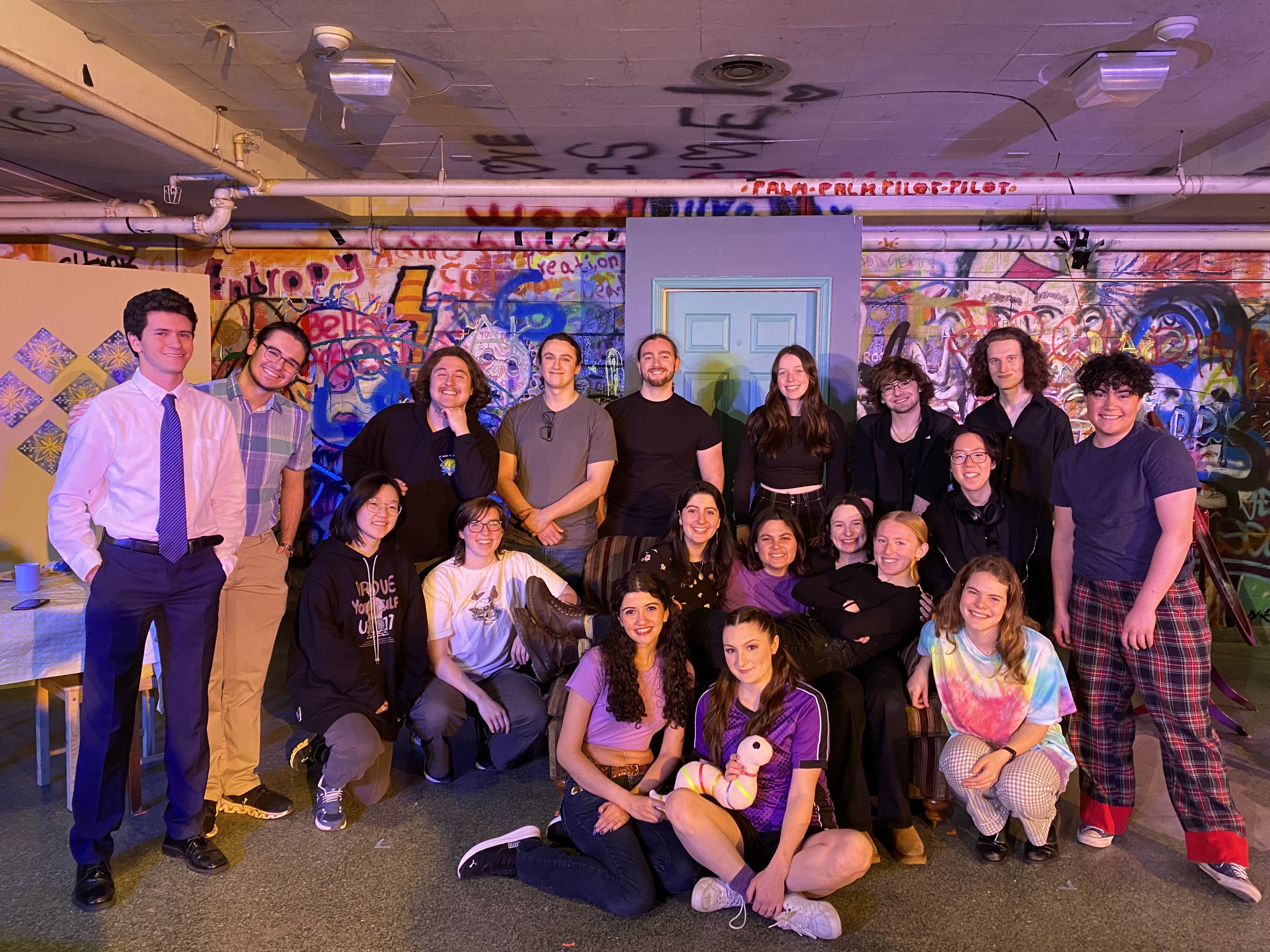
As dusk fell on Friday, April 5, I joined many other theatergoers in shuffling down the steps to WestCo Café, scanning a QR code to access a program, and sitting down to enjoy the student-written show “Dear Mommy.” It felt like sitting down to watch any other Spike Tape show. What I couldn’t predict, however, was the profound emotional impact that “Dear Mommy” would have on me, one I’m still parsing as I write this days later.
“Dear Mommy,” written by Kyra Kushner ’24 and directed by Rachel Wachman ’24, explores grief, trauma, motherhood, and daughterhood, as well as so much more. The show was beautifully thought out, with each scene building on the next to create a layered and complex story. It shows us the relationship between Riley and her mother, who inadvertently passes the struggles she deals with onto her daughter, and the way that affects Riley as she faces her mom’s death.
When writing this piece, Kushner said she initially was trying to write an entirely different play for a class taught by Assistant Professor of Theater Edwin Sanchez, but was struggling to get it together. Suddenly, Kushner explained, the idea for “Dear Mommy” just came to her, and soon she was furiously writing away. The inspiration for the piece, unsurprisingly, was Kushner’s own relationship with her mother. The love and pain that came from that relationship were palpable in the performance.
“Like many people and their parents, my relationship with my mother has always been complex,” Kushner wrote in an email to The Argus. “We both love each other dearly, but we have both hurt each other in many different ways. I have always thought that hard emotion is fuel for art. Dear Mommy is my entire heart and soul. It takes everything about me and lays it on the page so candidly. This play is a piece of me. It is raw and it is genuine and it is real.”
After putting these deeply personal ideas onto the page, Kushner began to assemble a team to put the play on. She asked Wachman to direct the play in November of 2023, though Wachman was initially hesitant.
“I was honestly shocked when she asked me,” Wachman wrote in an email to The Argus. “It sounded like an amazing project, but I told her that she should find someone who knew what they were doing. We ended up chatting about it a couple days later. I read the script and was immediately both blown away and moved to tears. I’m a writer and a storyteller. I decided to say yes to directing Dear Mommy because when else would I have the opportunity to explore storytelling in this manner?”
Seizing the day and stepping out of her comfort zone, Wachman worked to bring Kushner’s vision to life, joined by Stage Manager Rebecca Drucker ’24, Assistant Stage Manager Natalie Silver ’26, and Tech Director Owen Wiley ’25 after the Spike Tape Show Selection Committee approved the production.
“When Rachel pitched this show to me, she promoted the idea of a women-led show and that idea stuck with me,” Drucker wrote in an email to The Argus. “I think it was really special to be a part of a show that not only emphasized highs and lows of girlhood but also focused on it through a lens controlled by women through its writing, directing, and stage management.”
As the show began to take shape, so did the audition and rehearsal process. Kushner was already set to play the main character, Riley, but wanted little to no part in the actual auditions and casting decisions, instead leaving that up to Wachman and her creative vision.
“We organized [auditions] over winter break, so we could hit the ground running, and everyone was so talented,” Drucker wrote. “Planning was super tricky. We casted people with very busy schedules, but with the magic of Google Calendar, we managed to find time. Natalie and I would have a stage manager lunch each Monday where we would schedule a couple weeks in advance.”
Wachman, who initially felt daunted by the task of directing a show, described how she adjusted to the role.
“I had never directed before, and I hadn’t been involved with theater since the start of high school. I had confidence in my creative vision, but I was worried other people wouldn’t,” Wachman wrote. “But from [day one], everyone on our cast and crew just seemed to believe in me. There was so much trust involved throughout the whole process, and I definitely would not have been able to do this without that trust. It means so much to me that all these people were willing to take a chance on me in this way, and that’s really what guided me through those moments of doubt.”
One of the most interesting aspects of the play is the way that Kushner’s own life and family history is woven into it.
“Dear Mommy is not just a letter to my mother, it’s a heartfelt expression of love, pain, frustration, and an earnest apology,” Kushner wrote. “While it is a representation of my past, it also is an imagination of my future—this piece represents every part of me, it means the world to me, and I am so grateful to the people along the way who helped me make this.”
Additionally, Kushner was surprised by the experience of playing a character in a show she wrote. While writing the play, she didn’t intend to act in it, which she expressed was a good thing.
“With hindsight, I’m glad that is how I was thinking about it, because I think that if I had written this play with the idea that I would act in it, I would not have been as true to the play and its characters,” Kushner wrote. “Ultimately, acting in my own play as a character I strongly based off myself was both one of the most rewarding and anxiety-producing experiences of my life…. It was a constant emotional roller coaster, but at the end of the day and with the support from friends, I came upon the conclusion that embracing the play’s vulnerability is important, and if acting is my means of processing and expressing myself, I should fully embrace it.”
Because of this particularly vulnerable material, the team had to be very purposeful and thoughtful in their interactions with the subject matter. This manifested itself in the way that rehearsals were run and in the way that the cast analyzed and expanded on the text.
“I think the biggest challenge was making sure we took the time and care necessary for each scene,” Drucker wrote. “Beyond blocking just intimacy…there were so many heavy emotions and topics in this show that are all so significant to us. Even though we only had a few months (and, again, very busy schedules), it was really necessary to make sure that we handled this in a way that would be rewarding and meaningful, not harmful.”
Wachman, who is an English major, explained that she tried to organize rehearsals like a book club in order to parse some of the show’s more sensitive material. This helped to not only let the cast process the text, but also bring the characters to life.
“We would read through a scene and discuss it,” Wachman wrote. “I’d have each cast member talk about their character’s motivations in the scene and maybe some questions their character might have or questions they, as the actors, would like to ask their characters. We really approached this play from a character-driven point of view.”
This emphasis on character showed through onstage. In “Dear Mommy,” we get a glimpse into Riley’s life and the ups and downs of mother/daughter dynamics. As we flash back to Riley’s childhood, the lights (designed by Lighting Designer Alex White ’26 and Assistant Lighting Designer Cassie Wo ’27) and sound (designed by Sound Designer Aden Sheingold ’26 and Assistant Sound Designer Cas Kauffman ’26) perfectly shift to denote a shift in the characters: Riley switches to playing her mother in the past and interacts with younger versions of herself, played by Bailee Gull ’24 and Chloé Naudet ’27.
As these different generations of Riley share the stage, it might be easy to assume that it was too busy, or that the audience was confused. However, thanks to Wachman’s magnificent direction, every moment of the show’s staging flowed perfectly with Kushner’s text.

“Kyra made it clear from the start that this would be my project to direct,” Wachman wrote. “Mostly I just followed my instinct and trusted that it would contribute to the overall strength of the story we were all working together to bring to life. I think having such a strong friendship with her and that pre-existing trust made it a lot easier for us to communicate and work together on such an incredibly meaningful project.”
This creative vision paid off handsomely. Kushner, after handing off creative control entirely to Wachman, was blown away by the direction in which Wachman took her work.
“In a lot of ways, what Rachel created feels very real to what I wrote, and in many other ways, the performance is something that exceeded my expectations and brought new dimensions to the characters and themes I had envisioned,” Kushner wrote. “Seeing it come alive on stage, with the wonderful other actors embodying the roles and Rachel’s vision adding layers of depth, brought a level of richness and complexity that I hadn’t fully anticipated but gladly welcomed.”
One of the most potent cross-generational moments addresses Riley’s struggle with an eating disorder. In the scene, adult Riley relapses into binge eating on one end of the stage when, suddenly, teenaged Riley sits up in bed, walks to the living room, and tells her mom about her own struggle with this disorder. Riley’s mother responds in a way that hurts her daughter, trying to apologize but floundering. It’s a heartbreaking scene, and beautiful nonetheless.
“This was an incredibly difficult and vulnerable moment, particularly as I navigated it in a public setting,” Kushner wrote. “However, the work that I did to get to this moment proved to be incredibly rewarding and valuable. It felt like I had taken a moment of intense emotion of my life and turned it into a moment of empowerment that I could reclaim. It truly felt like a moment of processing and growth to be able to be so open and candid about it.
Other members of the outstanding cast included Cyrus Berger ’24, Drew Weddig ’24, and Celeste Borletti ’25 who played the adult Riley’s brother Ben, her husband Chris, and her daughter Olive, respectively. Berger brought down the house with his Borat impression, Weddig broke our hearts with his portrayal of a supportive husband getting betrayed, and Borletti gave the audience a chance to see the painful cycle of trauma starting all over again.
The show also showed off the fantastic acting chops of Theo Bellavia-Frank ’27 in the role of Riley’s fun-loving father, who shared some of the cutest scenes of the show with Gull’s young Riley. Wilson Boutwell ’27 played a wonderfully awkward boyfriend to Naudet’s teenaged Riley, trying his best to compliment his girlfriend but inadvertently making a difficult conversation worse. All of these characters and the spectacular actors that portrayed them were indispensable in telling Riley’s story.

“I am so proud of every single person who participated in Dear Mommy,” Wachman wrote. “The show truly would not have been possible without our beyond-talented cast and our brilliantly creative crew. I was constantly blown away by the thoughtfulness our actors brought to their characters, and I am forever grateful to the crew for making all my tech dreams come true.”
The physical space of the show brought the narrative to life just as much as the cast. With a different set for each act, every detail was carefully thought out. Set Designer Ronnie Rauch ’26 built an ambiance of nostalgia and familiarity, immersing the audience in Riley’s world.
As the play came to a close, the pieces of the production came together in a magnificent and poignant way. With Riley becoming increasingly like her mother, the audience felt a building sense of dread, heartbreak, and eerie familiarity. Both the cast and the crew worked hard to create the atmosphere this moment required.
“The lights and the sounds that the tech team constructed added so much to a scene that was already so carefully thought-out, and I’m really proud that I was able to be a (small) part of helping everything come together in this really beautiful scene,” Drucker wrote.
The company’s camaraderie was another standout of the experience for Wachman, who emphasized that despite the heavy subject matter, the cast and crew had a blast with the show.
“It was such a joy to work with everyone in our cast, and we’d often have to pause running a scene because someone would crack a joke and we’d all dissolve into laughter,” Wachman wrote. “That, for me, was part of what made this experience so meaningful. We really started out as a group of people who vaguely knew each other, and we ended up becoming a family.”
The audience deeply enjoyed the piece, and tickets for the production’s three shows sold out in minutes. Kushner expressed both anxiety and excitement at putting such a personal piece of her life on the line and out there for everyone to see.
“This experience truly brought up some of the most mixed emotions I have ever felt in my entire life,” Kushner wrote. “It was heartbreaking, fulfilling, scary, and calm all at the same time. Ultimately, I feel proud and I am glad I could put a piece of work out there very dear and near to my heart that hopefully others could relate to and feel too.”
I wish I could expand upon every little thing that made this show fantastic, but I simply can’t. There aren’t enough words in the English language. If you saw it, you know what I mean. If you didn’t, I hope you can someday, somehow. I can only say that “Dear Mommy” was a rousing success, a heartbreaking story, and a deeply personal narrative of a mother and a daughter navigating their complicated world.
“Dear Mommy is about learning how to accept one’s own flaws and love others in spite of what makes them imperfect,” Wachman wrote. “Riley is far from perfect, as is her mother. The play aims to showcase their humanity rather than hold them to impossibly high standards of perfection. This honest humanity is, for me, the crux of any meaningful story.”
Rachel Wachman is an Executive Editor for The Argus.
Sam Hilton can be reached at shilton@wesleyan.edu.


Leave a Reply